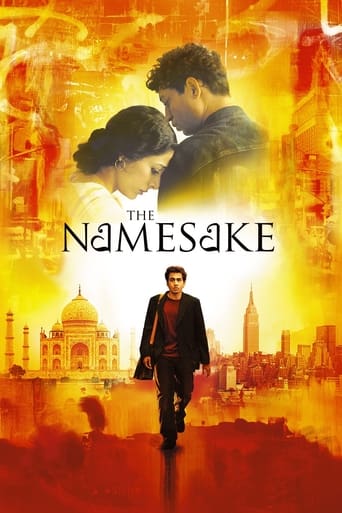ryanzellers2000
Throughout the novel Gogol's life is explained in depth and through time. But in the movie time is not as evident and for example when Gogol in the novel finds out his wife is cheating on him there is a huge build up, starting with Moshumi getting frustrated with Gogol constantly and Gogol being completely in the dark about Moshumi's unhappiness. Moshumi finds a letter from an old flame that she ends up meeting and she becomes unlawful to her husband. Eventually Gogol finds out. But in the movie there is no build up there is old flame he just approaches her on the subject one day in the airport and they split apart. After the divorce almost a year later they show Ashima leaving their house permanently. But there is no apparent time difference it makes you believe that Gogol isn't even divorced by the time his mother moves back to India.
squawlocal
I read the "namesake" as part of a school project, then we watched the movie in class. I thought that the movie did a good job of portraying what was said in the book. I did think that there were a few things that were left out of the movie that could have made it a little better.There were a few things that the movie brought light to that made me think about what other peoples lives are like. People who weren't born in the US. It shows the parallels between the cultures of India and America.All in all I think that this is a good movie, but there were some things that weren't done that I think would have made the movie better.
Sharbatanu Chatterjee
This two-hour-long adaptation of Jhumpa Lahiri's 'The Namesake' revolves around a child born in the USA to Bengali parents - the almost commonplace Indian scientist or professional moving to the USA and bringing up their next generation in the States - the generation of so-called ABCD's (American Born Confused Desi's). But what makes the narration and story-line interesting is the role names play in the drama and the subtle way in which it brings about the questions of identity, love and regret.The movie starts with a quintessential arranged marriage in Calcutta between Ashok (Irrfan Khan) and Ashima (Tabu). The subtle depictions of the growing love between the couple is heart-warming amidst the cold and harsh NY winters. Add to that the typical Indian cringing-of-the- nose at 'American' cultures (read freer dating and girlfriend-boyfriend cultures) and you have some comic relief. The character of the protagonist, Gogol Ganguli (Kal Penn) - a reference to the Russian author Nikolai Gogol, depicts the somewhat confused Indian experiencing the American dream. Kal's portrayal of the lad at cultural crossroads, as well as his regrets from failed relationships is something to really take back from the movie. Tabu and Khan were as balanced as the spice ratios in the delicately perfect Bengali shukto, though with a slight accent in their Bengali tongue (might be explainable - Irrfan's Ashok is supposed to be from Jamshedpur). The romanticism of the couple, finally separated by death, tinged with the nuances of Gogol's life form a major part of the movie.Overall, a thoughtful and soul-stirring delight, though the pace went a bit erratic towards the end. The music, though touching, could have been used to a much better effect. But still, this thought-provoker is a must watch for the desis and ABCD's alike!
bitesizemoviereview dotblogspotdotcom
This movie was good, but could have been a lot better. Although well-acted, I don't think the actors reached their full potential in this film adaption of Jhumpa Lahiri's novel. The pace of the movie was a bit slow, with the train wreck providing the only action. Also, Gogol's love life was treated as filler material, conveniently placed between moments of cultural unease with his family. There was no real sense of longing or searching on Gogol's part. In portraying his love affairs, the film did not do the novel justice--instead of using them as opportunities to convey Gogol's search for cultural identity, the film treats these affairs as soap opera material (cue the electric guitar, he's breaking up with her). I would have liked more emphasis on culture than on Gogol's love life. That aside, this movie is well-acted and there are plenty of touching scenes. Possibly the most emotionally-charged scene is when a young Gogol and his father stand on a cliff overlooking the ocean, talking about the journey they've made "to a place where there's nowhere left to go." The symbolism in these words--describing immigration to America--is compelling. Emotionally-charged scenes like this are what make The Namesake worth the watch.bitesizemoviereview.blogspot.com


